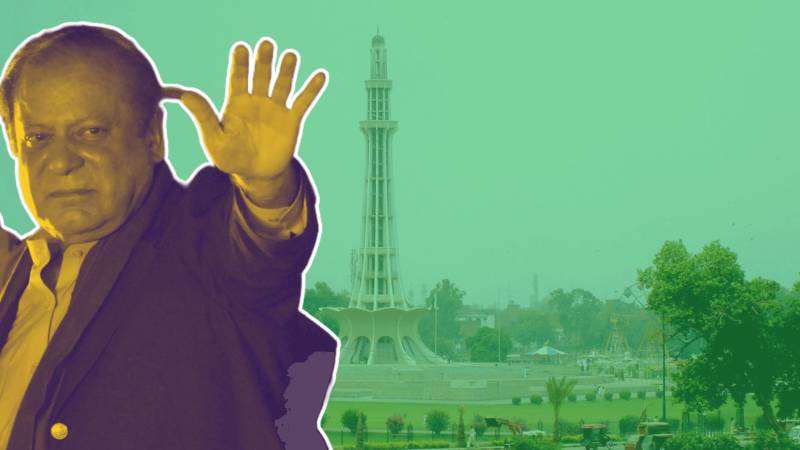
A public perception survey conducted by voters in different districts of Lahore showed that Nawaz Sharif, his PML-N party, was the most popular in the district.
The political pulse survey was conducted by the Centre for Public Opinion Research (CPOR) in Lahore between December 5 and 15 to gauge voter sentiments, preferences and political dynamics.
It took responses from 1,005 respondents with youngsters, those aged between 18-24 comprising only 12% of respondents, 25-34 comprising 28% of respondents, those between ages of 35-44 comprising 26% of respondents, 45-54 making up 20% of respondents and those aged 55 and above making up 14% of respondents. Most of the respondents were from central and northern Lahore.
Political popularity
When respondents were asked who they liked more as a person, 63% of respondents said they strongly or somewhat liked deposed prime minister and PML-N supremo Nawaz Sharif, while 57% of respondents said they liked former prime minister and PML-N President Shehbaz Sharif.
A substantial 45% of voters said they liked former prime minister and Pakistan Tehreek-e-Insaf (PTI) supremo Imran Khan.
Between the Pakistan Peoples Party (PPP) duo, Chairman Bilawal Bhutto Zardari edged his father and PPP Co-Chairman Asif Ali Zardari 21% to 16%.
Between PML-N Chief Organiser Maryam Nawaz, PML-N leader Hamza Shahbaz, former Punjab chief minister Chaudhry Pervez Elahi, former PTI General Secretary and Istehkam-e-Pakistan Party (IPP) Chairman Jahangir Khan and IPP President Abdul Aleem Khan, the PML-N duo were ahead of others.
Around 50% of respondents said they liked Maryam Nawaz, while 43% said they liked Hamza Shahbaz. Another 33% said they liked Elahi.
Among the IPP duo, more people liked Aleem Khan (23%) than Jahangir Khan Tareen (20%).
Voting patterns
The survey found that of the respondents, 43% said they had voted for the PML-N in the 2018 elections, 32% said they had voted for PTI, and 6% said they had voted for the Tehreek-e-Labbaik Pakistan (TLP). Another 2% voted for the PPP and one percent said they voted for the Jamaat-e-Islami (JI).
In the upcoming elections, a majority, or 46% of respondents, said they would vote for the PML-N. Around 29% said they would vote for the PTI, and 7% would vote for TLP. While the PTI lost support, the PML-N and the TLP appeared to gain support.
There was no change in the public attitude towards voting for the PPP or JI. However, around one percent of respondents said they would vote for IPP, which is mostly formed of defectors and disgruntled members of PTI.
In response to another question about which party's candidate they would want to see as the prime minister after the elections, 47% of respondents preferred the PML-N. Around 29% of respondents pointed to the PTI, and 7% of respondents named TLP.
Around 2% of respondents named the PPP, while JI and IPP received votes of 1% each.
Around 80% of respondents said they were firm on their choice of who they would vote for in the upcoming elections, while 11% said they could still change their minds.
On who respondents would like to see as the chief minister of Punjab after the upcoming elections, 34% of respondents pointed towards Shehbaz Sharif. Only 11% mentioned Chaudhry Pervez Elahi, and 4% mentioned Abdul Aleem Khan.
Maryam Nawaz received just 3% of respondent support, followed by Jahangir Tareen and Hamza Shahbaz at 2%.
Most important issues
When asked what respondents thought was the most important issue facing their area, most respondents, around 42%, identified the absence of gas as the biggest issue.
The second biggest issue by a large margin was that of sewerage. Only 15% of respondents identified it as the biggest issue they face in their area.
With just 12% of respondents pointing to it, the availability of clean drinking water was the third biggest issue for voters in Lahore.
Other major issues identified included lack of cleanliness (5%), broken roads (4%), inflation (4%), unemployment (2%), unpaved streets (2%), and electricity (2%).
When respondents were asked who did the blame most for these issues, 23% of respondents pointed fingers at the Pakistan Tehreek-e-Insaf (PTI) government. Around 18% of respondents blamed the coalition government helmed by the Pakistan Muslim League-Nawaz (PML-N). Around 17% of respondents blamed both the PTI and the PML-N coalition government.
Responding to the question about which political party had contacted the respondent to ask for their vote, the vast majority, 84%, said that no party had contacted them for the vote.

